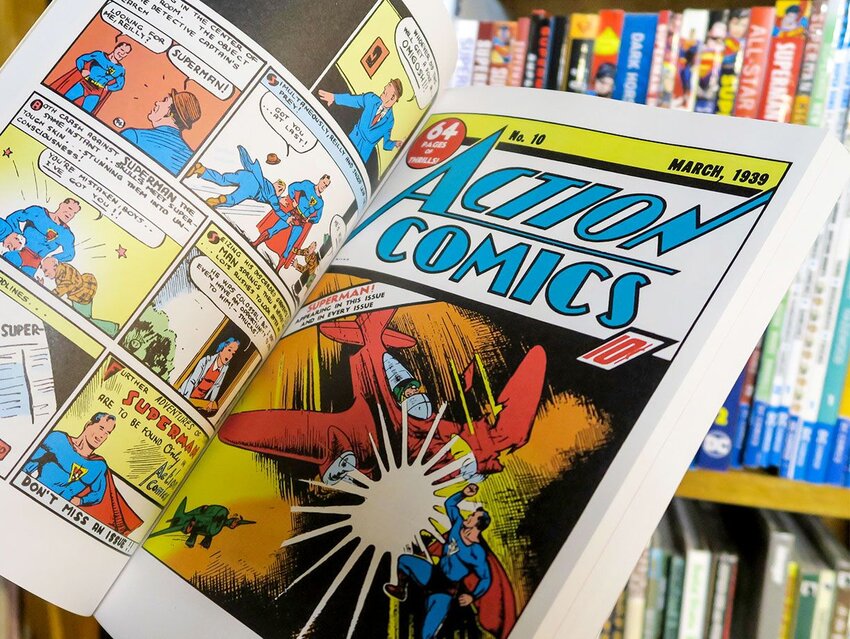A “conlang” is a constructed language developed for a fictionalized world. Among the more famous conlangs are Star Trek’s Klingon, Game of Thrones’ Dothraki, and Lord of the Rings’ Elvish, which have grown so popular that entire communities have developed around learning fluency in these made-up languages. While words from these particular conlangs haven’t really entered popular English usage, there are plenty of historical and contemporary examples of words coined in fictionalized worlds that have made their way over to real-world contexts. Here are a few:
Kryptonite
Coined in the Superman series in 1943 as a substance from the planet Krypton, which weakens the otherwise invulnerable hero, it’s believed this invented word comes from the combined roots of “krypton,” which is a (real) noble gas, plus “meteorite.” It has since entered the popular lexicon as a generic word for an Achilles’ heel, or the secret weakness of a seemingly impenetrable hero.
Yahoo
Before it became an internet search engine in 1994, “yahoo” was coined by Jonathan Swift in Gulliver’s Travels (1726), as the name for brutish humans in the made-up language of the Hoyhnhnms. It has remained in modern English to describe “a person lacking cultivation or sensibility, a philistine; a lout; a hooligan.”
Munchkin
Coined by American author L. Frank Baum in 1900 in The Wonderful World of Oz, “Munchkins” were residents of the fictional Munchkin County of Oz. Baum never explained where he got the word, but some Baum scholars believe it came from Münchner Kindl, the emblem of the German city of Munich, which literally means “little man.” It has since become an archaic (and offensive) word for a little person, a cutesy word for a child, and a Dunkin’ donut hole.
Quark
A “quark” is a hypothetical subatomic particle having a fractional electric charge, named in 1964 by U.S. physicist Murray Gell-Mann. In 1978, he told the editors at OED that he took the word from a nonsense poem in James Joyce’s Finnegans Wake, where it could have meant many things at once.
Muggle
In J.K. Rowling’s Harry Potter universe, a “muggle” is “a person who possesses no magical powers”. It has since slipped into the non-magical lexicon, even gaining an entry in the Cambridge Dictionary, to mean “a person who lacks particular skills.” It’s worth noting that “muggle” is not a part of “parseltongue,” a fully fleshed conlang developed by University of Cambridge professor of phonetics Francis Nolan as the language of serpents in the famous book and film franchise.
Jedi
As part of the Star Wars universe, Jedis are a specially trained group of leaders and peace-keepers. This word has entered the popular lexicon namely in the expression “Jedi mind trick,” wherein one can implant a suggestion in the minds of those they encounter to encourage them to comply with their wishes. Like “muggle,” “jedi” is not a part of the fully fleshed Star Wars conlang “Huttese,” spoken by evil alien gangster Jabba the Hutt and created by sound designer Ben Burtt.
Big Brother
Meaning “ubiquitous and repressive but apparently benevolent authority,” this expression comes from “Newspeak,” the language of the fictional Oceania, where George Orwell’s 1984 takes place. In the novel, it was the personification of the unseen monolithic leader of Oceania’s government, but nowadays it’s used in sometimes paranoid, sometimes humorous ways to illustrate ideas such as how our smartphones and voice assistants seem to be always listening. If you’re not of the suspicious mindset, you might enjoy watching a popular reality TV show called Big Brother on which the contestants are surveilled 24/7 in their isolated home.
Featured image credit: Patti McConville/ Alamy Stock Photo

